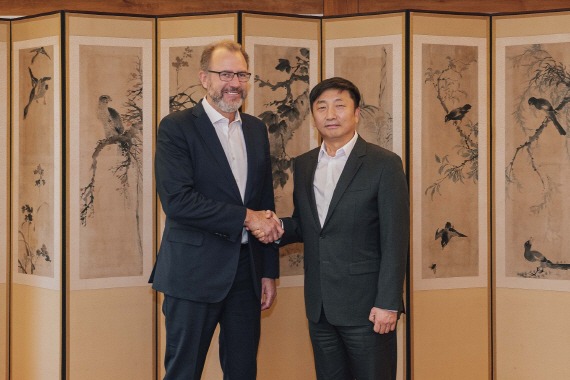Good Morning. This is the Sunya Scoop. The newsletter that takes energy transition news and turns it into an easy-to-read email for you.
Here’s what we have for you today:
-
SK and Exxon partner on blue ammonia
-
United launches $100 million Sustainable Flight Fund
-
KBR to commercialize SAF technology
-
Europe’s carbon market crosses $100 / ton
-
Methane management – Williams commits to OGMP 2.0 and Chevron & Egypt MOU
-
BMW to source low-carbon aluminum from Rio Tinto
-
Quote of the week on hydrogen
RENEWABLE FUELS

SK Materials joins forces with ExxonMobil in blue ammonia sector – KED Global
Dan Ammann, the president of ExxonMobil Low Carbon Solutions(left) and Lee Young-wook, the CEO of SK Materials South Korea’s SK Materials will enter the blue a
https://www.kedglobal.com/energy/newsView/ked202302220013
-
SK Materials partners with Exxon for blue ammonia production and adoption in South Korea
-
Agreement includes mass production of blue ammonia using new carbon capture tech
-
Blue ammonia produces blue hydrogen with minimal carbon emissions during burning
-
ExxonMobil will build a blue ammonia plant in Baytown, Texas
-
SK Materials plans to adopt blue ammonia as a power-generating fuel in South Korea’s domestic cogeneration
-
SK Materials also plans to expand cooperation with ExxonMobil for mid- to long-term carbon reduction solutions
RENEWABLE FUELS

-
United Airlines has launched the United Airlines Ventures Sustainable Flight Fund, an investment vehicle to support start-ups focused on the decarbonisation of air travel by accelerating research, production, and technologies associated with sustainable aviation fuel (SAF).
-
The fund starts with more than $100mm in investment from United and its inaugural corporate partners including Air Canada, Boeing, GE Aerospace, JPMorgan Chase, and Honeywell.
-
SAF is an alternative to conventional jet fuel that reduces GHG and can be made from used cooking oil, agricultural waste, household trash or forest waste.
-
United has invested in the future production of over three billion gallons of SAF, the most of any airline in the world.
-
United will educate consumers about their air travel carbon footprint by showing an estimate of each flight’s carbon footprint in their search and provide the choice to contribute to the UAV Sustainable Flight Fund before check-out.
RENEWABLE FUELS
-
KBR has launched Sustainable Aviation Fuel (SAF) technology in collaboration with Swedish Biofuels AB, a biofuel technology developer.
-
The technology can convert ethanol, carbon dioxide, and synthesis gas into SAF.
-
DARPA has validated the technology at Wright-Patterson Air Force Base.
-
The tech is unique as it produces ready-to-use jet fuel, rather than a blend component.
-
KBR aims to help the aviation sector in achieving sustainability objectives and reduce carbon emissions.
-
Swedish Biofuels has produced fully formulated SAF for testing, certification, and demonstration programs in the US, UK, Sweden, and Germany.
CARBON MARKETS
-
The price of carbon emissions permits in Europe’s ETS hit a record high of over 100 euros per tonne (USD $107).
-
An ETS sets a gradually decreasing cap on emissions, creating “carbon permits” for companies to buy for each tonne of CO2 they emit.
-
The British ETS covers power plants, aviation, and energy-intensive industries, with benchmark permits trading at around 85 pounds per tonne (USD $102).
-
China’s national ETS covers the power sector and is expected to expand to other carbon-intensive sectors, with permits trading at around 57 yuan (USD $8.29).
-
The EU’s ETS covers power plants, aviation, and energy-intensive industries, mandatory for all 27 EU members and covers around 40% of the bloc’s emissions, with permits trading at over 100 euros per tonne (USD $107).
-
New Zealand’s ETS covers electricity generators, manufacturers of liquid fossil fuels, and some forest owners, with prices trading around NZ$ 70 (USD $43).
-
The US RGGI covers several states, including Connecticut, Delaware, Maine, Maryland, Massachusetts, New Hampshire, New Jersey, Rhode Island, Vermont, and Virginia, with permits trading around $13.
-
South Korea’s ETS covers around 70% of the country’s economy, including the power sector, industry, and domestic aviation, with permits trading at around 13,000 Korean Won (USD $10).
-
The WCI covers California, Washington, Quebec, and Nova Scotia in Canada and includes electricity generators and large industrials, with permits trading around $27.
SUSTAINABILITY CORNER
-
Chevron and the Egyptian Ministry of Petroleum and Mineral Resources (MOPMR) have signed a MoU to share best practices and expertise on reduction of methane emissions.
-
The MoU is aligned with Egypt’s membership in the oil and gas track of the Global Methane Pledge.
-
The agreement includes workshops for MOPMR employees at Chevron facilities to build awareness of methane control technologies and measurement practices.
-
Williams has joined the United Nations Environment Programme’s Oil and Gas Methane Partnership 2.0 (OGMP 2.0).
-
OGMP 2.0 aims to improve methane emissions reporting and encourage progress in reducing emissions working with nearly 100 companies with operations in over 60 countries in the past two years.
-
Williams’ NextGen Gas program captures greenhouse gas reductions across the natural gas value chain using monitoring and measurement technologies.
-
Williams recently established a corporate venture arm and has invested in Orbital Sidekick and LongPath Technologies for satellite-based and laser-based emissions monitoring.
INDUSTRIAL DECARBONIZATION

-
BMW Group will source aluminum with reduced CO2 emissions from Rio Tinto’s hydro-powered operations in Canada from 2024.
-
The aluminum will be sourced using an innovative electrolysis method that eliminates all process-related CO2 emissions and potentially use up to 50% secondary material.
-
This approach can save around 70% of CO2 emissions compared to conventionally manufactured aluminum.
-
The planned supply volumes will be used exclusively in vehicle production at BMW Group Plant Spartanburg in South Carolina, USA.
-
The agreement covers aluminum alloys produced using electricity from renewable energy sources, with CO2 emissions that are only a third of the industry average.
-
The use of Rio Tinto’s blockchain technology ensures full traceability of the aluminum and end-to-end transparency throughout the supply chain to track compliance with environmental and social standards for raw material extraction.
We need all colours of hydrogen
While we would spell colors differently, we agree.
That’s a wrap for today. If you like what you read, send to a friend.
If someone forwarded you this and you liked it, consider subscribing below.
What’d ya think of today’s email? |
DISCLAIMER: None of this is financial advice. This newsletter is strictly educational and is not investment advice or a solicitation to buy or sell any assets or to make any financial decisions. Please be careful and do your own research.


